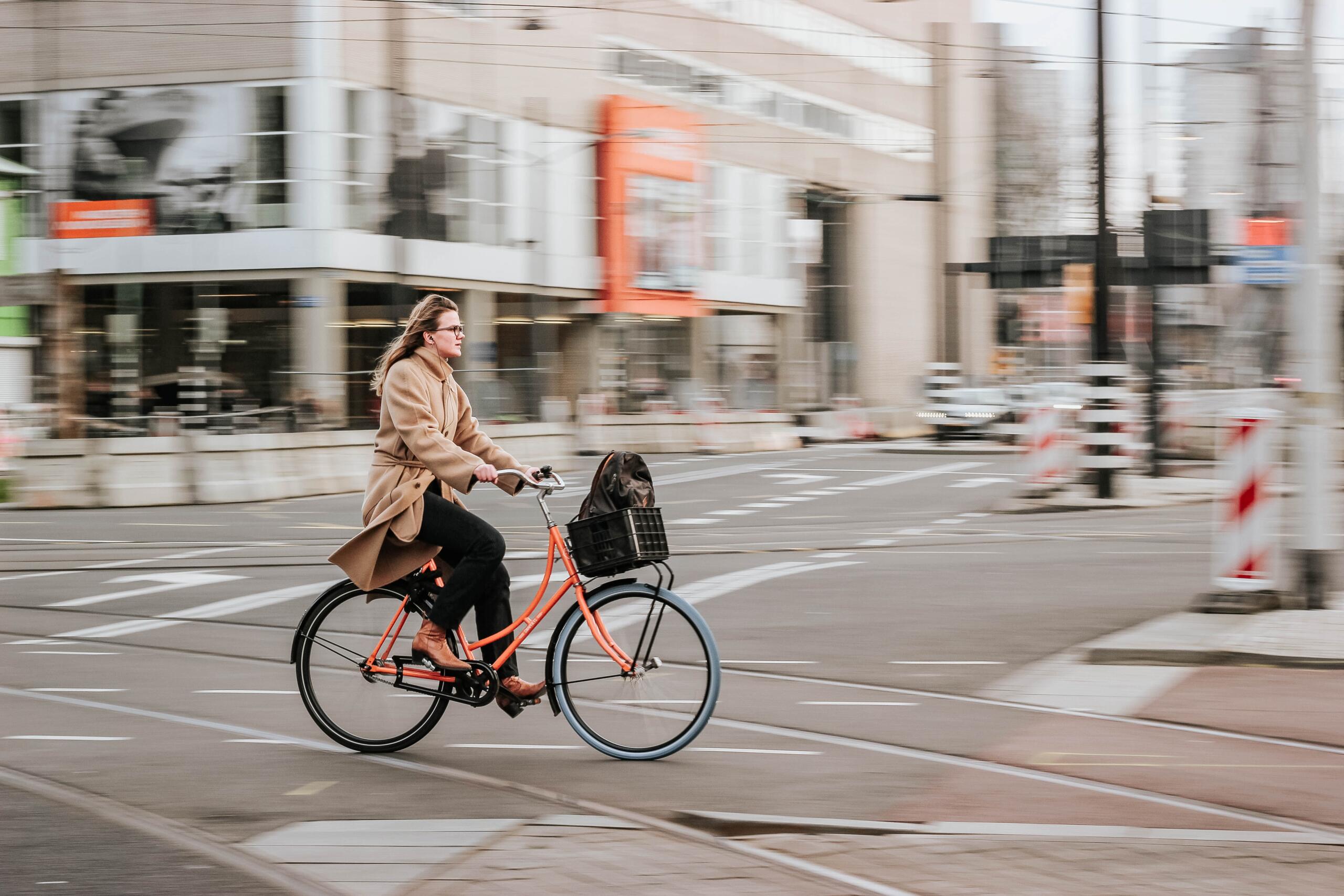Channelling Change
Gearing up for the upcoming Annual POLIS Conference 2022, POLIS' Secretary General Karen Vancluysen sat down for a conversation with the Keynote Speaker of our Opening Plenary, Professor of Socio-economic Transitions at the Faculty of Social Science at Erasmus University Rotterdam Derk Loorbach. Together they discuss the inevitable transition to a more sustainable urban mobility that cities and regions need to make.
POLIS: What do you consider to be the main transformative changes in mobility that local and regional governments will have to cope with in the coming years?

Pedestrians walking in Lisbon, Portugal. Credit: Zeynep Sümer / Unsplash
Derk (Loorbach): It is obvious that the shift to electricity and the phase-out of fossil combustion engines is by now inevitable and already happening. It is a major technological change that also brings along challenges for local governments to reform their energy infrastructure as well as to think about access and affordability. However, we need to ask whether this is the only transformative change we want: it is very clear that air pollution and dependency on fossil fuels need to be tackled, but we must also address issues of safety, inclusivity, justice, resources, and space.
In many ways, the individually owned car is a symbol of how cities and their citizens have developed into places where a lot of public space and resources are reserved to accommodate a very inefficient, energy- and space-intensive mobility system. If we envisage the transformation in mobility that we want and need, it should be a system that uses as few resources as possible and is accessible and affordable to all. By definition, this implies that we need to redesign our cities based on vicinity and connectivity through health mobility, public and collective mobility, and fair prices. Such a transformation implies massive technological and infrastructural changes, as well as deep cultural and institutional ones.
POLIS: Do you feel cities and regions are equipped to deal with these changes and are ready to use them to further their policy goals?
Derk: Cities across the world are making steps in this direction already by reducing speeds for cars, creating car-free zones, expanding cycling infrastructure and so on. New and existing companies are producing electric vehicles and introducing sharing schemes. Therefore, the main challenges do not seem to be a lack of ideas and alternatives, but the instruments and governance capacities to steward transformative change. Most government institutions are designed for stability and facilitating innovation to improve what we already have.
Indeed, transitions imply a transformative design strategy in which we try to build the new in an experimental way, phase out what is undesired, and gradually move in the desired direction. In general, one cannot navigate transitions with goals that need to be implemented: it is about [following] a direction and learning by doing. However, vested interests (also from within the government) and an institutional context that stimulate project-based and risk-averse working are [also] geared against this way of working.

Derk Loorbach
Derk is director of DRIFT and Professor of Socio-economic Transitions at the Faculty of Social Science, both at Erasmus University Rotterdam. Derk is one of the founders of the transition management approach as a new form of governance for sustainable development and has over one hundred publications in this area.
POLIS: What does your transition governance approach entail and how can it help cities to accelerate the shift to a just and sustainable mobility future?
Derk: Transition governance is a logic of 'radical thinking in the long term and diplomatic action in the short term'. It offers a philosophy and toolkit to influence the speed and direction of emerging transitions in society. For example, for the mobility transition, it can help if policy makers start to engage actors already part of advancing just and sustainable mobility in a process of reflection, vision-building, experimentation and learning.
The approach of ‘selective participation’ is about empowering ‘radical transitions’: in other words, it involves first defining the most desirable outcomes of a transition (from a social and ecological point of view) to then engaging those actors already working along those lines, empowering them and using design, experimentation, and policy platforms to make visible what is needed.

Travellers passing by in the London Underground station. Credit: Anna Dziubinska / Unsplash
POLIS: Which cities in your view are frontrunners when it comes to managing change? Which ones are taking the lead in adapting their institutional frameworks to address the transport transformation we are going through given the societal goals we need to achieve?
Derk: It is hard for me to make general statements based on research, but it is obvious that bigger cities like Copenhagen, Ghent, Oslo, and Paris are leading examples when it comes to the bike transition. I can only say that my city, Rotterdam, with which we have been working for years on this, is making similar steps and experimenting a lot with institutional conditions – things like using ‘parklets’ to reduce the number of public parking spaces, introducing ‘living streets’ or car-free zones, starting zero-emission zones, experimenting with building codes, reducing speed limits, widening cycling lanes, changing priority at traffic lights, among others. I only imagine cities everywhere are similarly trying to make the transition themselves.
The interesting challenge from our transition perspective is that every city is unique in its geography, climate, inhabitants, and political context, so each must make its own transition. At the same time, there are many similarities: the patterns of change, the technological possibilities, and the institutional conditions for a successful transformation are quite generic. It is through networks such as POLIS that cities can learn across spaces trans-locally and the overall transition is accelerated.
POLIS: Are you optimistic about the future of our cities?
Derk: Yes. Cities are leading at the forefront of addressing the most pressing issues as they are also the ones facing them. But, truth be told, they could do much more to accelerate even further and, more importantly, to put the desired direction for transitions first.

Cyclist in Rotterdam, the Netherlands. Credit: Michelle.com / Unsplash
As cities are less embedded in current economic models than national governments, they have more space to envisage and empower transitions toward future economic models that are rooted in the commons, based on a natural positive vision and ensuring a just and inclusive democratic model. I would hope that we can quickly broaden the tools and capacities cities have to co-create together with social entrepreneurs, citizens, and action researchers to create the context for desired and needed sustainability transitions.
Click here to read the article in its original format.
About the authors:
Carlotta Inserra is Communications Assistant at POLIS. Currently, she provides support for different communication activities, including POLIS’ corporate communications and magazine. She is passionate about the intersections between social impact, communications and storytelling.
Karen Vancluysen was appointed as Secretary General of POLIS in September 2014, after having been the network's Research Director for 8 years. Since 1998, she has been involved in urban mobility networking, innovation, and policy activities as well as a wide range of European urban transport research projects.
